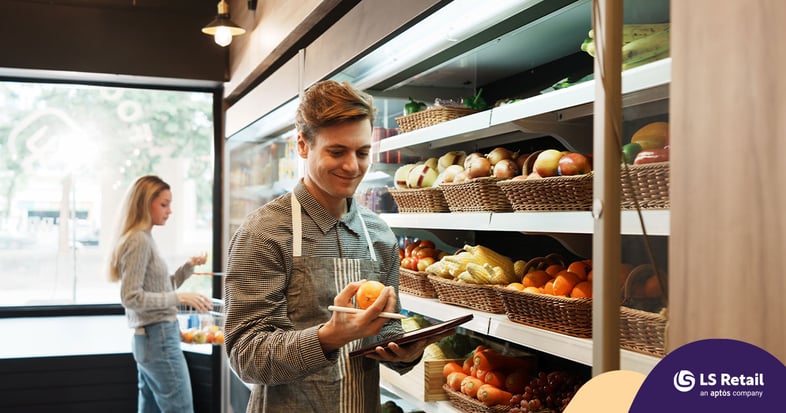
Food waste costs the global economy nearly US$1 trillion every year, while also accelerating climate change, biodiversity loss, and food insecurity. In the UK alone, supermarkets discard the equivalent of 190 million meals annually.
Balancing variety and freshness with waste reduction is no easy task—but it’s one worth solving. With the right tools and mindset, supermarkets can reduce waste, improve margins, and build trust with customers.
Here are six actionable strategies that can help.
1. Rethink expiration dates and pricing
Confusing or inconsistent expiration labels are responsible for up to 87% of grocery store food waste. Misinterpreted “best before” and “use by” dates lead to premature disposal of perfectly safe products, both by customers and store staff.
Make date labeling clear and consistent
Help your customers make better decisions by simplifying expiration labels. Clearly communicate the difference between safety dates and quality indicators.
Use digital tools to monitor freshness
Modern inventory systems can track expiration dates and alert staff when products are approaching the end of their shelf life, making it easier to manage markdowns or repurpose items before it’s too late.
Adjust prices in real time
Dynamic pricing systems can automatically reduce prices on near-expiry items. It’s an effective way to cut waste while giving customers good deals.
Takeaway: Expiration labels shouldn’t be a guessing game. When stores provide clarity and act on data, waste drops and customer confidence grows.
2. Use data to drive smarter decisions
Despite the availability of advanced technology, many supermarkets still rely on manual tracking and paper reports. This limits their ability to react quickly, predict demand, and reduce losses.
Replace guesswork with insights
Use demand forecasting and inventory analytics to align stock levels with real-world buying patterns. Knowing what sells—and when—means fewer unsold perishables.
Identify and correct waste patterns
Analytics can help spot recurring issues, like overordering in certain categories or poor product placement. With this knowledge, supermarkets can adapt quickly.
Adapt to shopper behavior
Integrating shopping data with AI tools allows you to anticipate what customers want, down to store or region level. You’ll waste less by stocking more of what sells, when it sells.
Takeaway: Your store is already generating data. Using it well turns waste into insight—and insight into action.
3. Upgrade refrigeration and monitoring systems
Supermarket refrigeration consumes more electricity than global data centers. It’s not just an environmental concern—any malfunction also puts valuable stock at risk.
Invest in energy-efficient appliances
Modern refrigeration systems maintain more stable temperatures while using less power. They also reduce the risk of spoilage due to inconsistent cooling.
Use IoT for real-time monitoring
Internet of Things (IoT) devices can alert staff to temperature fluctuations, energy inefficiencies, or impending equipment failure. Fixing issues early prevents waste and downtime.
See the bigger impact
In the last five years, food retailers using IoT monitoring have saved millions in spoiled stock—and prevented tons of carbon emissions.
Takeaway: Smart equipment protects your products, cuts costs, and makes your operations more sustainable.
4. Improve handling and staff training
Improper handling during storage, stocking, or transport is a major (and often avoidable) source of waste. One crushed box of berries can spoil a whole shelf.
Safeguard the cold chain
Many fresh items—especially dairy, meat, and seafood—are highly sensitive to temperature changes. A break in the cold chain, even for minutes, can lead to spoilage.
Train your staff effectively
The simplest fix? Training. When employees know how to rotate stock, store items correctly, and spot spoilage risks early, waste drops significantly.
Build awareness from the ground up
Encouraging a “waste-aware” culture helps staff take ownership and spot small issues before they become big losses.
Takeaway: Investing in your team is one of the most cost-effective ways to reduce waste—and improve operations across the board.
5. Make room for imperfect produce
A surprisingly large portion of fruits and vegetables are rejected simply because they don’t look right. But customers are increasingly open to buying “wonky” produce, especially when it’s offered at a discount.
Challenge the beauty standard
Odd-shaped carrots and marked apples taste just as good as their perfect-looking counterparts. Repositioning these items as “imperfect but delicious” can appeal to value-conscious shoppers.
Reduce farm-level waste
When retailers accept more natural variation, growers don’t need to overproduce to meet cosmetic standards. This eases pressure on the supply chain and reduces upstream waste.
Turn a liability into a selling point
Bundling odd-shaped produce into discounted boxes or highlighting them in recipe kits adds novelty and helps normalize more sustainable choices.
Takeaway: Looks aren’t everything. Embracing imperfection is a powerful way to reduce waste and support sustainable farming.
6. Donate edible surplus
Even with better forecasting and stock control, surplus is inevitable. But most supermarkets still donate only a small fraction of their excess food.
Create structured donation programs
Set up regular pickups with local charities and food banks. Many organizations now offer logistics support and reporting tools that make donations easier and more traceable.
Collaborate creatively
Explore partnerships beyond food banks—such as community kitchens, shelters, or food waste startups that repurpose unsold goods into ready meals or snacks.
Use redistribution platforms
Digital tools can help track surplus, match donations with recipients, and ensure that nothing edible goes to waste.
Takeaway: Surplus food has value. Giving it a second life supports your community and aligns with growing customer expectations for responsible retail.
A smarter path forward
Reducing food waste isn’t just about saving money, it’s about rethinking how we operate. It means treating food as a valuable resource, not a disposable commodity.
From clearer expiration labels and better forecasting to smarter appliances and donation strategies, today’s supermarkets have more tools than ever to make a difference.
Is your business ready to lead the change?
Contact our retail technology experts to discover how tailored software can manage food surplus efficiently.

